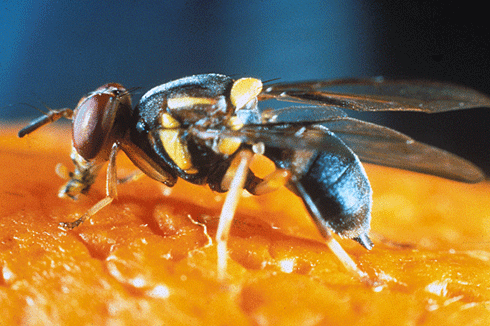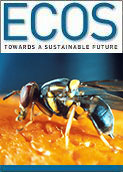
|
Published: 11 November 2013
Sterile flies: a pesticide-free way to stop the rot
CSIRO’s Biosecurity Flagship together with Horticulture Australia Ltd, Plant & Food Research Australia and the Department of Primary Industries and Regions South Australia are joining forces to find an environmentally friendly solution to the Queensland Fruit Fly (Q-fly) problem.

|
|
Sterile male Q-flies should help reduce the incidence of pest damage to orchards. Credit: CSIRO
|
Announcing the new partnership, South Australian Premier Jay Weatherill confirmed his state’s commitment to the establishment of a $3 million facility to breed male-only sterile Q-flies for use in Sterile Insect Technology (SIT) programs.
SIT is a scientifically proven method for suppressing or eradicating fruit fly populations and managing their potential impacts in horticulture production areas. It can be used in orchards, urban and environmentally sensitive areas, where application of conventional chemical treatments isn’t possible or is intrusive.
The Q-fly is one of Australia’s most damaging crop pests for a range of horticultural industries. It can inflict significant costs on producers through management costs, lost production and reduced export opportunities, and on government and industries through eradication campaigns in areas where fruit fly does not regularly occur. These costs all eventually flow through to consumers and taxpayers.
An outbreak of Q-fly in a major fruit or vegetable production area, such as the Riverland in South Australia, has the potential to impact Australia’s export and domestic horticulture markets.
The $3 million SA investment is in addition to a collaborative $15 million research and development consortium, which will focus on new technologies to produce the male-only sterile Q-flies, effective release strategies, and monitoring technologies needed to underpin effective area-wide control of Q-fly.
SIT approaches have already been used with great success around the world and in South Australia to combat Mediterranean fruit fly. However, the development of male-only sterile Q-fly will be a world-first, and the research effort will significantly enhance the cost-effectiveness of SIT.
Source: CSIRO



